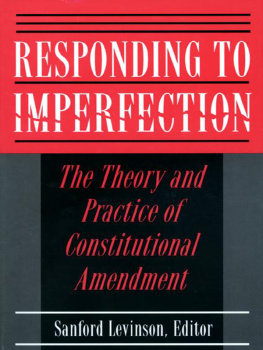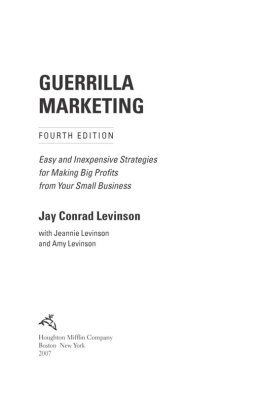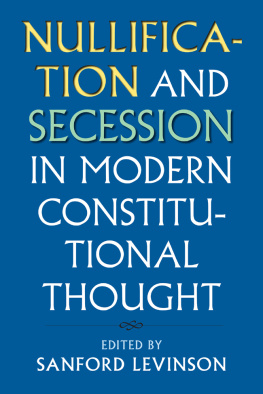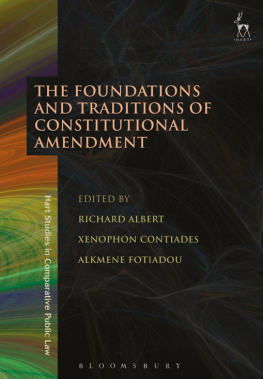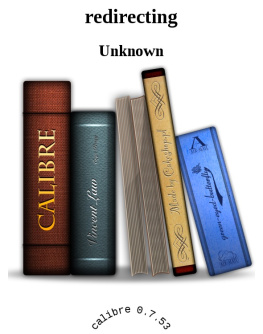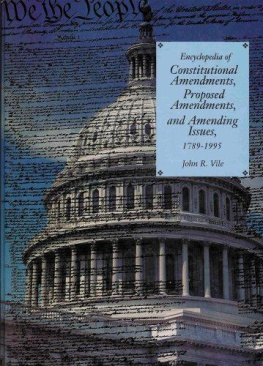Levinson - Responding to Imperfection: the Theory and Practice of Constitutional Amendment
Here you can read online Levinson - Responding to Imperfection: the Theory and Practice of Constitutional Amendment full text of the book (entire story) in english for free. Download pdf and epub, get meaning, cover and reviews about this ebook. year: 2013, publisher: Princeton University Press, genre: Politics. Description of the work, (preface) as well as reviews are available. Best literature library LitArk.com created for fans of good reading and offers a wide selection of genres:
Romance novel
Science fiction
Adventure
Detective
Science
History
Home and family
Prose
Art
Politics
Computer
Non-fiction
Religion
Business
Children
Humor
Choose a favorite category and find really read worthwhile books. Enjoy immersion in the world of imagination, feel the emotions of the characters or learn something new for yourself, make an fascinating discovery.
Responding to Imperfection: the Theory and Practice of Constitutional Amendment: summary, description and annotation
We offer to read an annotation, description, summary or preface (depends on what the author of the book "Responding to Imperfection: the Theory and Practice of Constitutional Amendment" wrote himself). If you haven't found the necessary information about the book — write in the comments, we will try to find it.
Responding to Imperfection: the Theory and Practice of Constitutional Amendment — read online for free the complete book (whole text) full work
Below is the text of the book, divided by pages. System saving the place of the last page read, allows you to conveniently read the book "Responding to Imperfection: the Theory and Practice of Constitutional Amendment" online for free, without having to search again every time where you left off. Put a bookmark, and you can go to the page where you finished reading at any time.
Font size:
Interval:
Bookmark:

RESPONDING TO IMPERFECTION
RESPONDING TO IMPERFECTION
THE THEORY AND PRACTICE OF CONSTITUTIONAL AMENDMENT
Sanford Levinson, Editor
PRINCETON UNIVERSITY PRESS PRINCETON, NEWJRSEY
Copyright 1995 by Princeton University Press
Published by Princeton University Press, 41 William Street,
Princeton, New Jersey 08540
In the United Kingdom: Princeton University Press,
Chichester, West Sussex
All Rights Reserved
Library of Congress Cataloging-in-Publication Data
Responding to imperfection : the theory and practice of constitutional amendment / Sanford Levinson, editor.
p. cm.
Includes index.
eISBN 1-4008-0489-2
1. United StatesConstitutional lawAmendments.
2. Constitutional amendments. I. Levinson, Sanford, 1941 . KF4555.A75R47 1995
342.7303dc20
[347.3023] 94-27766 CIP
This book has been composed in Galliard
Crude Foyer from Collected Poems by Wallace Stevens, copyright 1947 by Wallace Stevens, is reprinted by permission of Alfred A. Knopf, Inc.
TO THE MEMORY OF
Judith Shklar
WHO FEARLESSLY ANALYZED
THE MEANING OF LEGALISM
IN THE LATE TWENTIETH CENTURY
One Sanford Levinson |
Two Sanford Levinson |
Three Stephen M. Griffin |
Four Bruce Ackerman |
Five Akhil Reed Amar |
Six David R. Dow |
Seven Frederick Schauer |
Eight Walter F. Murphy |
Nine John R. Vile |
Ten Mark E. Brandon |
Eleven Donald S. Lutz |
Twelve Stephen Holmes and Cass R. Sunstein |
Thirteen Noam J. Zohar |
I AM GRATEFUL to various program chairs of the American Political Science Association, who allowed me to organize panels over a four-year period that explored various aspects of the issues surrounding constitutional change and the notion of amendment. Several of the papers in this volume were first presented in that venue, and others were suggested by the discussions that ensued. A key participant in two of those panels was Will Harris, of the University of Pennsylvania. Unfortunately, circumstances made it impossible for him to contribute to this volume, but no one should doubt the immense impactreflected explicitly in several of the essaysthat he has had on those who study the theory of constitutional amendment. Chapter Four of his book The Interpretable Constitution is essential reading for anyone who shares these interests (as is, indeed, the entire book).
As always, the University of Texas Law School was supportive in every way, not least by giving me the opportunity to teach a seminar on the metatheory of constitutional amendment. My secretary, Cheryl Harris, is unending in her conscientiousness and good cheer, which made preparation of the final manuscript much easier.
I am also grateful to Malcolm DeBevoise of Princeton University Press for his consistent encouragement of this project, and for his toleration of the inevitable delays attached to edited collections. I appreciate as well Lois Kriegers thoughtful copy editing. Most of all, though, I must thank the contributors themselves, who participated in this project with unfailing cooperation.
RESPONDING TO IMPERFECTION
One
SANFORD LEVINSON
ON JUNE 11, 1787, George Mason of Virginia opened the discussion of constitutional amendment at the constitutional convention in Philadelphia with a forthright statement that the plan now to be formed will certainly be defective, as the Confederation has been found on trial to be. Amendments therefore will be necessary, and it will be better to provide for them, in an easy, regular and Constitutional way than to trust to chance and violence.
The title of this collection, Responding to Imperfection, is a recognition of Washingtons and Masons wisdom. One should not minimize the importance of their acknowledgment of imperfection. Surely more than a few founders of political orders have been tempted to adopt John Lockes conceit, when he drafted the 1669 Fundamental Constitutions
This truly radical implication of the notion of amendment is more than a little frightening, and James Madison can perhaps be viewed as trying to return to a more Lockean emphasis on inalterability when he emphasizes in The Federalist, No. 49 the need for a reverence for the laws that should, consequently, lead us to reject any frequent recourse to popular appeals that would carry an implication of some defect in the government. As Stephen Griffin argues in his essay in this book, the success in achieving Madisons sacralization of the Constitution may well have been purchased at a price of discouraging recognition of its all-too-present imperfections and/or blinding us to the ways that we have in fact responded to those imperfections by significantly, if sometimes stealthily, modifying our constitutional principles.
In any event, perhaps the basic questions within any jurisprudential system will be, first, the substantive criteria by which one in fact defines imperfection and, then, the procedural means by which one responds to any such recognitions. How does (or should) presumptively necessary change take place within a given legal order? These are, obviously, analytically separable questionsone is descriptive, the other normative. Both are, however, central to this book.
As Washington noted, the framers of the Constitution themselves indirectly acknowledged the possibility of imperfection by including within it Article V, which provides a procedure of amendment. Given the frequency with which Article V will be cited in the articles below, it is probably most efficient to set it out in full here (and, concomitantly, to ask the reader to return here when necessary in order to consult the specific text of Article V):
Article V
The Congress, whenever two thirds of both Houses shall deem it necessary, shall propose Amendments to this Constitution, or, on the Application of the Legislatures of two thirds of the several States, shall call a Convention for proposing Amendments, which, in either Case, shall be valid to all Intents and Purposes, as part of this Constitution, when ratified by the Legislatures of three fourths of the several States, or by Conventions in three fourths thereof, as the one or the other Mode of Ratification may be proposed by the Congress; Provided that no Amendment which may be made prior to the Year One thousand eight hundred and eight shall in any Manner affect the first and fourth Clauses in the Ninth Section of the first Article; and that no State, without its Consent, shall be deprived of its equal Suffrage in the Senate.
Next pageFont size:
Interval:
Bookmark:
Similar books «Responding to Imperfection: the Theory and Practice of Constitutional Amendment»
Look at similar books to Responding to Imperfection: the Theory and Practice of Constitutional Amendment. We have selected literature similar in name and meaning in the hope of providing readers with more options to find new, interesting, not yet read works.
Discussion, reviews of the book Responding to Imperfection: the Theory and Practice of Constitutional Amendment and just readers' own opinions. Leave your comments, write what you think about the work, its meaning or the main characters. Specify what exactly you liked and what you didn't like, and why you think so.

